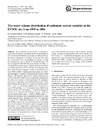Please use this identifier to cite or link to this item:
https://accedacris.ulpgc.es/jspui/handle/10553/49803
| Title: | The water column distribution of carbonate system variables at the ESTOC site from 1995 to 2004 | Authors: | González-Dávila, M. Santana-Casiano, J. M. Rueda, M. J. Llinás Gonzalez, Octavio |
UNESCO Clasification: | 251002 Oceanografía química | Keywords: | Time-Series Site Dissolved Inorganic Carbon Station Knot 44-Degrees-N Western North Pacific South China Sea, et al |
Issue Date: | 2010 | Publisher: | 1726-4170 | Project: | Modelo Físico-Químico Para la Región Macaronesica. Evaluación y Potencial Aplicación Aperacional Eurosites-Integration And Enhancement Of Key Existing European Deep-Ocean Observatories Marine Carbon Sources And Sinks Assessment (Carboocean) CANIGO (MAS3-CT96-0060) FLUCAN” (2002-01548) |
Journal: | Biogeosciences | Abstract: | The accelerated rate of increase in atmospheric carbon dioxide and the substantial fraction of anthropogenic CO2 emissions absorbed by the oceans are affecting the anthropocenic signatures of seawater. Long-term time series are a powerful tool for investigating any change in ocean bio-geochemistry and its effects on the carbon cycle. We have evaluated the ESTOC (European Station for Time series in the Ocean at the Canary islands) observations of measured pH (total scale at 25 °C) and total alkalinity plus computed total dissolved inorganic carbon concentration (CT) from 1995 to 2004 for surface and deep waters, by following all changes in response to increasing atmospheric carbon dioxide. The observed values for the surface partial pressure of CO2 from 1995 to 2008 were also taken into consideration. The data were treated to better understand the fundamental processes controlling vertical distributions in the Eastern North Atlantic Ocean and the accumulation of anthropogenic CO2, CANT. CT at constant salinity, NCT, increased at a rate of 0.85 μmol kg−1 yr−1 in the mixed layer, linked to an fCO2 increase of 1.7±0.7 μatm yr−1 in both the atmosphere and the ocean. Consequently, the mixed layer at ESTOC site has also become more acidic, −0.0017±0.0003 units yr−1, whereas the carbonate ion concentrations and CaCO3 saturation states have also decreased over time. NCT increases at a rate of 0.53, 0.49 and 0.40 μmol kg−1 yr−1 at 300, 600, and 1000 m, respectively. The general processes controlling the vertical variations of alkalinity and the inorganic carbon distribution were computed by considering the pre-formed values, the production/decomposition of organic matter and the formation/dissolution of carbonates. At 3000 m, 30% of the inorganic carbon production is related to the dissolution of calcium carbonate, increasing to 35% at 3685 m. The total column inventory of anthropogenic CO2 for the decade was 66±3 mol m−2. A model fitting indicated that the column inventory of CANT increased from 61.7 mol m−2 in the year 1994 to 70.2 mol m−2 in 2004. The ESTOC site is presented as a reference site to follow CANT changes in the Northeast Atlantic Sub-tropical gyre. | URI: | https://accedacris.ulpgc.es/handle/10553/49803 | ISSN: | 1726-4170 | DOI: | 10.5194/bg-7-3067-2010 | Source: | Biogeosciences [ISSN 1726-4170], v. 7, p. 3067-3081 |
| Appears in Collections: | Artículos |
SCOPUSTM
Citations
92
checked on Jun 8, 2025
WEB OF SCIENCETM
Citations
93
checked on Feb 1, 2026
Page view(s)
315
checked on Jan 15, 2026
Download(s)
215
checked on Jan 15, 2026
Google ScholarTM
Check
Altmetric
Share
Export metadata
Items in accedaCRIS are protected by copyright, with all rights reserved, unless otherwise indicated.
